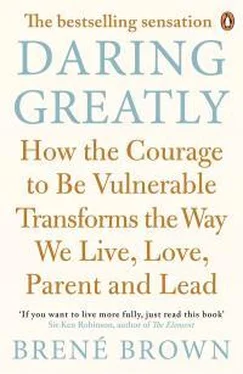UNTANGLING SHAME, GUILT, HUMILIATION, AND EMBARRASSMENT
In fact, as we work to understand shame, one of the simpler reasons that shame is so difficult to talk about is vocabulary. We often use the terms embarrassment, guilt, humiliation, and shame interchangeably. It might seem overly picky to stress the importance of using the appropriate term to describe an experience or emotion; however, it is much more than semantics.
How we experience these different emotions comes down to self-talk. How do we talk to ourselves about what’s happening? The best place to start examining self-talk and untangling these four distinct emotions is with shame and guilt. The majority of shame researchers and clinicians agree that the difference between shame and guilt is best understood as the difference between “I am bad” and “I did something bad.”
Guilt = I did something bad.
Shame = I am bad.
For example, let’s say that you forgot that you made plans to meet a friend at noon for lunch. At 12:15 P.M., your friend calls from the restaurant to make sure you’re okay. If your self-talk is “I’m such an idiot. I’m a terrible friend and a total loser”—that’s shame. If, on the other hand, your self-talk is “I can’t believe I did that. What a crappy thing to do ”—that’s guilt.
Here’s what’s interesting—especially for those who automatically think, You should feel like a terrible friend! or A little shame will help you keep your act together next time . When we feel shame, we are most likely to protect ourselves by blaming something or someone, rationalizing our lapse, offering a disingenuous apology, or hiding out. Rather than apologizing, we blame our friend and rationalize forgetting: “I told you I was really busy. This wasn’t a good day for me.” Or we apologize halfheartedly and think to ourselves, Whatever. If she knew how busy I am, she’d be apologizing . Or we see who is calling and don’t answer the phone at all, and then when we finally can’t stop dodging our friend, we lie: “Didn’t you get my e-mail? I canceled in the morning. You should check your spam folder.”
When we apologize for something we’ve done, make amends, or change a behavior that doesn’t align with our values, guilt—not shame—is most often the driving force. We feel guilty when we hold up something we’ve done or failed to do against our values and find they don’t match up. It’s an uncomfortable feeling, but one that’s helpful. The psychological discomfort, something similar to cognitive dissonance, is what motivates meaningful change. Guilt is just as powerful as shame, but its influence is positive, while shame’s is destructive. In fact, in my research I found that shame corrodes the very part of us that believes we can change and do better.
We live in a world where most people still subscribe to the belief that shame is a good tool for keeping people in line. Not only is this wrong, but it’s dangerous. Shame is highly correlated with addiction, violence, aggression, depression, eating disorders, and bullying. Researchers don’t find shame correlated with positive outcomes at all—there are no data to support that shame is a helpful compass for good behavior. In fact, shame is much more likely to be the cause of destructive and hurtful behaviors than it is to be the solution.
Again, it is human nature to want to feel worthy of love and belonging. When we experience shame, we feel disconnected and desperate for worthiness. When we’re hurting, either full of shame or even just feeling the fear of shame, we are more likely to engage in self-destructive behaviors and to attack or shame others. In the chapters on parenting, leadership, and education, we’ll explore how shame erodes our courage and fuels disengagement, and what we can do to cultivate cultures of worthiness, vulnerability, and shame resilience.
Humiliation is another word that we often confuse with shame . Donald Klein captures the difference between shame and humiliation when he writes, “People believe they deserve their shame; they do not believe they deserve their humiliation.” If John is in a meeting with his colleagues and his boss, and his boss calls him a loser because of his inability to close a sale, John will probably experience that as either shame or humiliation.
If John’s self-talk is “God, I am a loser. I’m a failure”—that’s shame. If his self-talk is “Man, my boss is so out of control. This is ridiculous. I don’t deserve this”—that’s humiliation. Humiliation feels terrible and makes for a miserable work or home environment—and if it’s ongoing, it can certainly become shame if we start to buy into the messaging. It is, however, still better than shame. Rather than internalizing the “loser” comment, John’s saying to himself, “This isn’t about me.” When we do that, it’s less likely that we’ll shut down, act out, or fight back. We stay aligned with our values while trying to solve the problem.
Embarrassment is the least serious of the four emotions. It’s normally fleeting and it can eventually be funny. The hallmark of embarrassment is that when we do something embarrassing, we don’t feel alone. We know other folks have done the same thing and, like a blush, it will pass rather than define us.
Getting familiar with the language is an important start to understanding shame. It is part of the first element of what I call shame resilience.
I GET IT. SHAME IS BAD. SO WHAT DO WE DO ABOUT IT?
The answer is shame resilience. Note that shame resistance is not possible. As long as we care about connection, the fear of disconnection will always be a powerful force in our lives, and the pain caused by shame will always be real. But here’s the great news. In all my studies, I’ve found that men and women with high levels of shame resilience have four things in common—I call them the elements of shame resilience. Learning to put these elements into action is what I call “Gremlin Ninja Warrior training.”
We’ll go through each of the four elements, but first I want to explain what I mean by shame resilience. I mean the ability to practice authenticity when we experience shame, to move through the experience without sacrificing our values, and to come out on the other side of the shame experience with more courage, compassion, and connection than we had going into it. Shame resilience is about moving from shame to empathy—the real antidote to shame.
If we can share our story with someone who responds with empathy and understanding, shame can’t survive. Self-compassion is also critically important, but because shame is a social concept—it happens between people—it also heals best between people. A social wound needs a social balm, and empathy is that balm. Self-compassion is key because when we’re able to be gentle with ourselves in the midst of shame, we’re more likely to reach out, connect, and experience empathy.
To get to empathy, we have to first know what we’re dealing with. Here are the four elements of shame resilience—the steps don’t always happen in this order, but they always ultimately lead us to empathy and healing:
Recognizing Shame and Understanding Its Triggers.Shame is biology and biography. Can you physically recognize when you’re in the grips of shame, feel your way through it, and figure out what messages and expectations triggered it?
Practicing Critical Awareness.Can you reality-check the messages and expectations that are driving your shame? Are they realistic? Attainable? Are they what you want to be or what you think others need/want from you?
Reaching Out.Are you owning and sharing your story? We can’t experience empathy if we’re not connecting.
Читать дальше






![Брене Браун - Вопреки. Как оставаться собой, когда всё против тебя [litres]](/books/436389/brene-braun-vopreki-kak-ostavatsya-soboj-kogda-v-thumb.webp)





